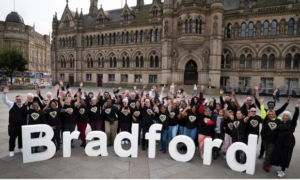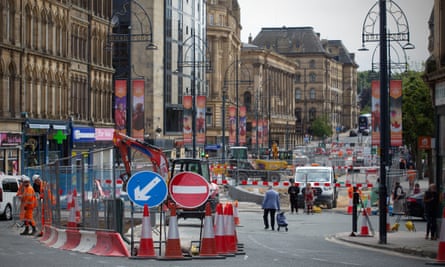West Yorkshire city to host magic, music, film and theatre performances celebrating local talent, plus Turner prize

Volunteers celebrating the launch of Bradford 2025 UK City of Culture on 12 September 2024. Photograph: Owen Humphreys/PA Media Assignments/PA
A city centre magic show, the Brontës as you’ve never seen them before, and a bassline house symphony are all part of Bradford’s City of Culture lineup, which its organisers call a celebration of everything that makes the West Yorkshire city great.
Shanaz Gulzar, the creative director of Bradford 2025 UK City of Culture, said the whole of the country was invited to come next year to a place she billed as young, diverse, creative and “the heart of the UK”.
“The UK is invited to Bradford in 2025,” she said. “Not only will audiences want to be celebrating everything that makes Bradford great, but it’ll also be a part of the change for this vibrant city and district.”
Steven Frayne, formerly known as the magician Dynamo, will start the year with his new performance Rise, which is inspired by the story of his grandfather teaching him magic as a child growing up in Bradford. It is directed by the theatre director Kirsty Housley and will be staged in the city centre, not far from where Frayne used to perform street magic.
The Turner prize will be hosted in the Cartwright Hall, which boasts one of the biggest collections of South Asian and Black British art in the UK. This year’s show of works by nominees, who include Claudette Johnson and Pio Abad, opens in Bradford in September 2025.

Charles Hazlewood introduced his collaborative piece, Bradford Progress, which sees him team up his para-orchestra with Jeremy Deller for a “sonic journey” that will be staged across the district and involve local musicians.
“This thing might start far out somewhere on a moorland crag, someone singing or someone playing, and that person moves, and then they encounter another musician who perhaps joins them. And bit by bit, this thing grows in scale and scope, exponentially,” said Hazlewood.
“This thing is gradually snaking its way towards Bradford, getting ever larger. So by the time it arrives in the centre of Bradford, there should be one big last, giant hurrah.”
Traditionally, city of culture programmes could be criticised for not platforming enough local talent, but Bradford 2025 contains plenty of artists who call the city home.
The theatre company Common Wealth will present new work; the local director Jack King (who won the inaugural Sean Connery prize at the Edinburgh film festival) is also involved; while Andrea Dunbar’s work will be performed in her home town 45 years after her first play, The Arbor, debuted. The West Yorkshire film-maker Clio Barnard, who directed a verbatim documentary about Dunbar’s life and that of her children, will present a series of films from working-class northern women at the city’s Pictureville cinema.
Other cinematic offerings include a live score of Mathieu Kassovitz’s classic La Haine by the Asian Dub Foundation, while Mike Kenny’s Olivier award-winning adaptation of The Railway Children will be performed on the Keighley & Worth Valley railway line.
The city’s literary family, the Brontës, also feature in a project in which a new generation of writers reinterpret their work, and Orchestra of Opera North teams up with bassline musicians such as DJ Q and TS7 for Bassline Symphony as the genre’s tracks are reimagined by classical musicians.
Bradford saw off competition from Southampton, County Durham and Wrexham county borough to take the city of culture crown.

But there have been serious concerns about whether Bradford will be ready to host the year-long celebrations, which start in January. There is a continuing £45m infrastructure project to pedestrianise large parts of the city centre that has been delayed and left much of it looking like a building site.
The scheme is designed to reduce congestion and air pollution, but as with delays to the 4,000-seat music venue, Bradford Live, the local press has been critical of the amount of time it is taking.
Organisers and local politicians have emphasised the increased investment and opportunities that being a cultural capital can bring, however. Hull saw £219m pour in during and after its city of culture year in 2017.
Lisa Nandy, the secretary of state for culture, media and sport, said: “This celebration of talent born and bred in the city will help to get more people of all ages and backgrounds involved in cultural events, creating good jobs and opportunities for young people.”


